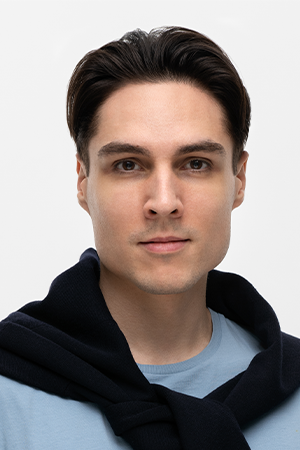
27 February 2026 19:00 | |
28 February 2026 13:00 | |
13 March 2026 19:00 |
The dancer has a light, soaring leap, elastic and soft turns, well-defined phrasing of complex passages and expressive gestures. His bold dance is typically artistic and with subtle nuances. And in addition to everything else, he’s also very handsome.
Ballet magazine
Mariinsky Theatre soloist Timur Askerov who performed the role (of Oberon) deserved the nomination: with his long and well-defined legs he never skimped on the magnificent leaps, clean spins and dazzling battus.
Moskovsky Komsomolets
• Honored Artist of Azerbaijan (2018)
• Recipient of the Spirit of Dance prize in the category “Rising Star” (Ballet magazine, 2012)
• Prize-winner at the XII International Ballet Dancers’ and Choreographers’ Competition in Moscow (1st prize, 2013)
• Recipient of the Azerbaijan Presidential Youth Prize for Culture (2013, diploma and gold medal)
• Awarded with an honorary diploma of the Plenipotentiary Representative of the President of Russia in the North-Western Federal District for high achievements in the field of culture (2018)
Born in Baku (Azerbaijan).
Graduated from the Baku School of Dance in 2008.
The same year, he joined the Azerbaijan State Academic Mirza Fatali Akhundov Opera and Ballet Theatre.
From 2009–2011 he worked at the National Academic Shevchenko Opera and Ballet Theatre of Ukraine.
Joined the Mariinsky Ballet in 2011. Principal since 2015.
Repertoire includes:
Giselle (Count Albrecht), choreography by Jean Coralli, Jules Perrot and Marius Petipa,
The Sleeping Beauty (Prince Désiré); choreography by Marius Petipa, revised version by Konstantin Sergeyev,
The Sleeping Beauty (Prince Désiré); choreography by Marius Petipa, revival of the 1890 production, staging by Sergei Vikharev,
La Bayadère (Solor); choreography by Marius Petipa, revised version by Vladimir Ponomarev and Vakhtang Chabukiani,
Swan Lake (Prince Siegfried, the Prince's Friends); choreography by Marius Petipa and Lev Ivanov, revised version by Konstantin Sergeyev,
Raymonda (Jean de Brienne); choreography by Marius Petipa, revised version by Konstantin Sergeyev,
Le Corsaire (Conrad, Ali); production by Pyotr Gusev after the composition and choreography of Marius Petipa,
Don Quixote (Basilio); choreography by Alexander Gorsky after Marius Petipa,
Schéhérazade (Zobeide’s Slave); choreography by Michel Fokine,
George Balanchine's ballets Ballet Imperial (soloist), A Midsummer night’s Dream (Oberon) and Jewels (Diamonds),
The Nutcracker (the Nutcracker Prince); staging by Vasily Vainonen,
Romeo and Juliet (Romeo); choreography by Leonid Lavrovsky,
Shurale (Ali Batyr); choreography by Leonid Yakobson,
Grand pas classique, choreography by Viktor Gzovsky,
Carmen-Suite (José); choreography by Alberto Alonso,
Frederick Ashton’s ballets Sylvia (Aminta), Marguerite and Armand (Armand),
The Legend of Love (Ferkhad); choreography by Yuri Grigorovich,
Variations for two couples; choreography by Hans van Manen,
Cinderella (the Prince),
Le Parc (Soloist); choreography by Angelin Preljocaj,
Benjamin Millepied's ballets Without, La nuit s’achève,
Infra; choreography by Wayne McGregor,
The Bronze Horseman (Eugene); choreography by Yuri Smekalov,
Paquita (Andrés); choreography by Yuri Smekalov, reconstruction and staging of Marius Petipa's choreography (Act III Grand Pas) by Yuri Burlaka;
Le Divertissement du roi (the King); choreography by Maxim Petrov,
Concerto for Contrabass; choreography by Yuri Smekalov.
Repertoire also includes:
Chopiniana (the Youth); choreography by Michel Fokine,
Divertimento; choreography by Dmitry Pimonov.
In April 2015 at the Bolshoi Theatre he performed the role of Ferkhad in the ballet The Legend of Love with choreography by Yuri Grigorovich.
